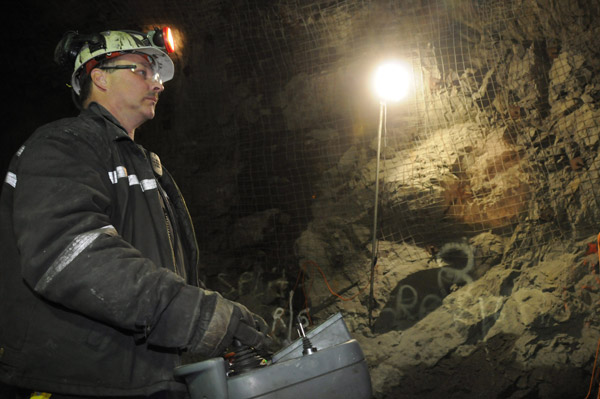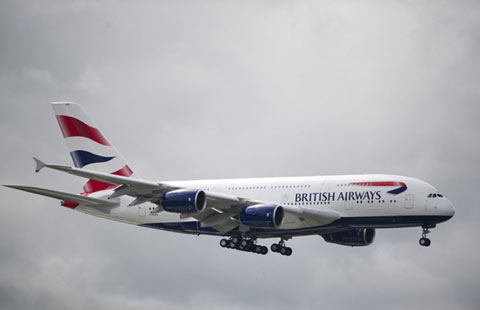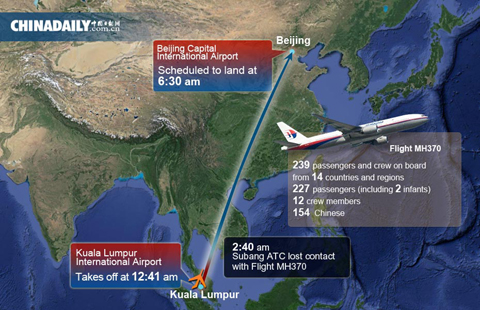Brazil's Vale adjusts iron ore shipping
Updated: 2014-03-10 05:59
By ELIANA KIRSHENBLAT in New York (China Daily Latin America)
|
|||||||||
 |
|
A workman operates a remote solo drill at the 710-foot level of a Vale SA garson mine in Sudbury, Ontario, Canada in 2010. Provided to China Daily |
Brazil-based mining giant Vale SA (Sociedade Anônima) has steadily been increasing its focus on its Chinese business. Vale announced this week that they are preparing a "green iron ore blend" to help Chinese steel makers produce less carbon dioxide pollution in their mills. Vale will store this China-targeted product at its new $1.4 billion Malaysian distribution center, created specifically to cut shipping costs to China and scheduled to open in July.
The special eco-friendly ore will be mixed at the company’s new Malaysian distribution center, according to Vale’s website. The center will receive its first loads of iron ore from Brazil in March and then send its first cargoes to China and other Asian countries in July.
The center is a key factor in the company’s efforts to cut transportation costs to China, which are higher for Vale than its main rivals Australia’s BHP Billiton and Rio Tinto, whose main mines, both located in Australia, are closer to China.
Vale’s deliveries to China were further complicated when, in early February, China’s Ministry of Transport issued new regulations which barred the use of cargo ships over 250,000 deadweight tons. This was a problem specifically for Vale due to its multibillion-dollar investment program to build a fleet of giant carriers, dubbed Valemaxes, capable of loading 400,000 deadweight tons of cargo.
Vale reported that Asia represented 54.2 percent of its total revenues in 2013, with China alone accounting for 38.6 percent. As Vale’s revenue increasingly relies on foreign exports, rather than domestic trade, more of Vale’s growing iron ore production will go to China. Vale recently announced that it is planning to increase its total iron ore production by 50 percent to more than 450 million tons a year by 2018.
They are planning for their Malaysia investment to handle the brunt of transportation costs. João Mendes de Faria, president of Vale China, said China’s refusal to admit the company’s huge carriers had reduced the "efficiency" of delivering iron ore to the Chinese market, but said the establishment of the Malaysia center would bring improvement to Chinese customers. "With Malaysia and our floating stations, our logistic strategy over the short and medium term has been settled," he said.
Vale’s transportation costs are about $22 per ton now and should fall by $4 to $5 a ton for shipments to China after the Malaysia center opens. Malaysia will receive cargos via the giant Valemax iron ore carriers.
If the Valemaxes were able to take cargoes directly to China they would save about $7 a ton over current costs, Jose Carlos Martins, the company’s head of ferrous metals, said in a statement. Australian iron ore producers have normally had a $10 per ton freight advantage over Brazilian ore.
The world trend, though, is toward larger vessels, according to Martins, and the fact that ports in Japan, Korea, Malaysia and the Philippines accept the bigger ships will push China to eventually accept them.
Currently, due to the Chinese rules, Vale has had to anchor their massive vessels outside Chinese waters near Subic Bay in the Philippines. From there Vale uses smaller ships to feed cargo shipments to China.
Most Viewed
Editor's Picks

|

|

|

|

|

|
Today's Top News
Missing jet may have disintegrated - source
Affirmative action and US courts
Tougher penalty for underage prostitutes
ROM opens gates of China's Forbidden City
Heavy metal magic
Managing cultural assets starts with a head count
Ford to expand China R&D: report
Chinatowns' seafood markets source of infection
US Weekly

|

|













